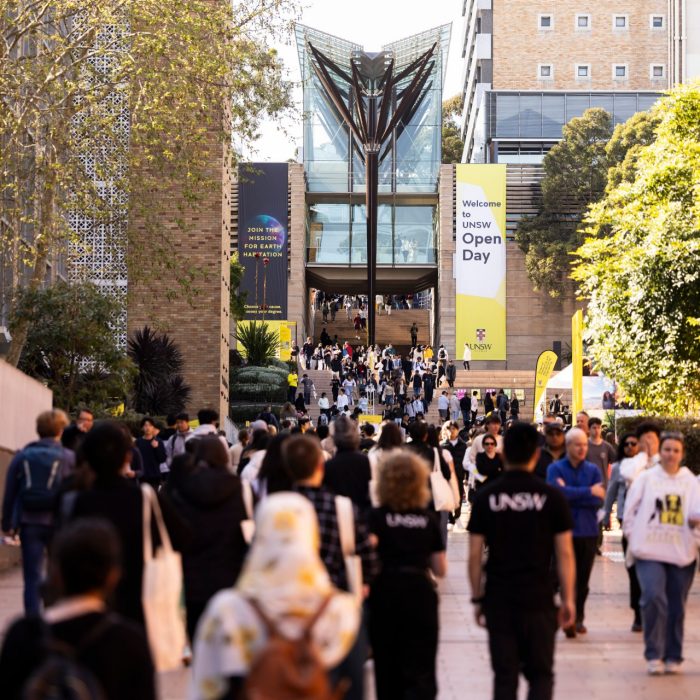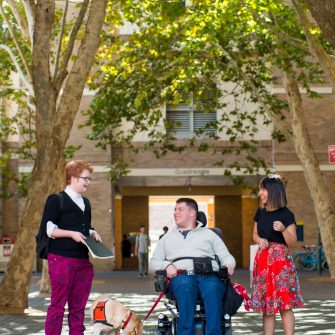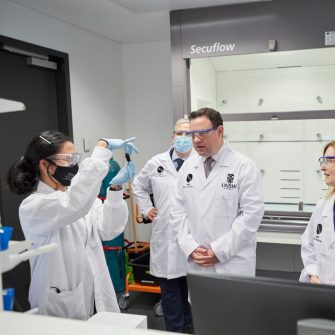Represent UNSW on the world stage

- Position description
- How to apply
-
The South Asia Regional Director is responsible for leadership of UNSW’s South Asia operations and shaping the University’s India Strategy through the execution of an in-country program, strategic relationship management and the provision of targeted advice to the Deputy Vice-Chancellor (Global), Director, Future Students as well as Faculties and Divisions.
The position is responsible for jointly leading UNSW’s student recruitment objectives in India and across South Asia ensuring the University recruits the highest quality students and that all recruitment targets are met, while shaping initiatives to expand access and opportunity to high-achieving aspirational students. In addition, the South Asia Regional Director is responsible for major initiatives in India including new business development, strategic partnerships and events, such as alumni and delegation visits, to support the office of the Vice-Chancellor and Deputy Vice-Chancellor Global, Division of Research and Enterprise, Division of Social Impact, Equity & Engagement and Division of Education & Student Experience to achieve University-wide key performance indicators. The position is responsible as the primary person for all South Asia related initiatives and activities, and manages relationships with government agencies, Australian diplomatic missions in India and across the region, and related peak bodies.
The South Asia Regional Director reports to the Director, Future Students with a dotted reporting line into the Deputy Vice-Chancellor (Global), and supervises the following staff:
- Future Students Regional Director, South Asia (shared reporting line into Head of International Recruitment)
- Finance Manager
- Office Manager
- GTE & Admissions Team Lead, and indirect team of Admissions Triage Officers
-
Specific accountabilities for this role include:
- Manage the development and execution of UNSW’s India Strategy, including day-to-day operations through the management of the University’s in-country presence via its India Centre. Responsibilities include coordination with other UNSW affiliated entities such as joint ventures and research centres.
- Working with the Director Future Students, Head of International Recruitment, Deputy Vice-Chancellor (Global), Faculties and Divisional stakeholders, lead UNSW’s student recruitment operations in India ensuring that the University meets its commencing enrolment plan and students are recruited to the highest quality through all channels including agents, schools, partner universities and direct applications.
- Relationship management of key government, diplomatic and industry stakeholders including but not limited to the Ministry of Education, Municipal, District and Provincial Government Departments, academies, industry investors, Australian diplomatic missions in India, Foundation Studies Campuses, feeder schools, recruitment agents, partner universities.
- Provision of advice to University stakeholders and responsibility for all aspects of India engagement ensuring the Vice-Chancellor & President, Deputy Vice-Chancellor (Global), University Leadership Team members, Faculties and Divisions are supplied with high-quality advice regarding the University’s strategic and tactical interests in India, as well as the in-country implementation.
- Project management of major initiatives related to the implementation of the 2025 Strategy and future strategic initiatives in India, and across the South Asia region, ensuring projects are managed according to agreed milestones within budget and all project outcomes are delivered.
- Oversee event management of major strategic events in support of the University’s interests across the region such as India Profile Raising, Student Recruitment and Research Roadshows, Technology Promotion Seminars and Academic Conferences, partner and UNSW-affiliated events ensuring that all events deliver reputational dividends to UNSW and are managed within agreed milestones, within budget promoting UNSW, NSW and Australia.
- Working with the Director Future Students, Deputy Vice-Chancellor (Global) and the Corporate Communications Team, implement activities to elevate UNSW’s academic profile among targeted audiences including academics, research institutes and other affiliated partners such as PR agencies as required.
- Work closely with the University’s Finance and Governance to ensure the University’s India operations are compliant with best practice in corporate governance, assurance, risk management, and regulatory compliance in both Australia and India, and keep abreast of India’s complicated and rapidly evolving business environment.
- Implement the UNSW Health and Safety Management system within your area of responsibility. Align with and actively demonstrate the UNSW Values in Action: Our Behaviours and the UNSW Code of Conduct.
-
- Relevant tertiary qualifications in an appropriate discipline with substantial work experience in a similar role in a large organisation (i.e., university, relevant government agency, non-government or non-profit organisation), or an equivalent level of knowledge gained through any combination of education, training and/or experience.
- Demonstrated experience managing complex relationships with key international stakeholders such as foreign governments, diplomatic missions and/or multilateral organisations.
- Proven track record in managing complex projects with high-level critical thinking and analytical skills plus the ability to distil complex information and finalise development objectives.
- Demonstrated experience leading the establishment and management of entities in India which are affiliated with foreign entities such as Representative Offices, Wholly Foreign Owned Enterprises and/or Joint Ventures.
- Demonstrated experience managing staff and cultivating a safe, diverse and respectful working environment to support the professional development of teams.
- Ability to handle sensitive information confidentially and discreetly.
- Fluency in Hindi and English with a strong knowledge both Australian and Indian higher education systems and the Australia-India bilateral relationship.
- Proven experience as an excellent relationship builder, with acute advocacy and influencing skills, with clear communication skills and a track record of successfully managing internal and external stakeholder relationships.
- Ability and capacity to direct and monitor the implementation and effectiveness of the safety management system. An understanding of and commitment to UNSW’s aims, objectives and values in action, together with relevant policies and guidelines.
- Knowledge of health and safety responsibilities and commitment to attending relevant health and safety training.
Pre-employment checks required for this position
- Verification of qualifications
-
As places of great inspiration and innovation, Australian universities are crucial intellectual environments where knowledge is created, communicated, and challenged. In partnership with government and business, academic research and technologies help to develop vital industries. In addition, Australian universities provide students with the skills to compete in increasingly global workplaces and are ourselves major employers.
Universities are key to Australia’s economic success. In 2018, Australian universities contributed $41 billion to the economy and supported a total of 259,100 full time jobs. In addition, 1,426,594 students studied at Australia’s 39 universities in 2018. Of these, 71 per cent (or 1,014,027) were domestic students and the remaining 29 per cent (or 412,567) were international students. In the same year, 325,171 students completed their degrees.[1]
When it comes to world university rankings, Australia has a strong, proven track record. Across all global ranking systems, criteria and fields of study, Australia ranks highly for quality of education, student satisfaction, and global reputation. The latest ranking shows more than eight Australian universities are ranked in the top 200 universities and almost two-thirds of Australia’s 39 universities are in the top 500.[2] In addition, Australia consistently ranks highly in the Universitas 21 Report – in 2020, it ranked ninth.[3]
Australian university students pursue a wide range of academic disciplines, from health and education to engineering and information technology. While the majority of students study full-time, others balance a part-time load with family or work responsibilities, and, in the current environment, many combine on-campus and online study for maximum flexibility.
International education is Australia’s fourth largest export and the largest services export industry. In 2019, the industry generated $40.3 billion in export income. The higher education sector contributed around 70 per cent (or $27.8 billion) of international education export income in 2019.[4]
The 2018 Excellence in Research for Australia (ERA) national report, which provides information of the quality of research undertaken by Australian universities, assessed that over 90 per cent of Australian university research was performing at, or above world standards in 2018.[5]
UNSW is a founding member of the Group of Eight (Go8), a coalition of Australia’s leading research-intensive universities, and the prestigious Universitas 21 international network. In world rankings Go8 universities are consistently the highest ranked in Australia. Seven of the Go8’s members are in the world’s top 100 universities and all Go8 members are ranked in the world’s top 150 universities: in the Academic Ranking of World Universities (ARWU) from Shanghai Jiao Tong University, the Times Higher Education Rankings (THES) and the QS World University Rankings (QS).[6]
[1] 2020, Universities Australia 2020 Higher Education Facts and Figures
[2] 2020, Universities Australia 2020 Higher Education Facts and Figures
[3] 2020, Universities Australia 2020 Higher Education Facts and Figures
[4] 2020, Universities Australia 2020 Higher Education Facts and Figures
[5] 2018 Excellence in Research for Australia (ERA) 2018 report, produced by the Australian Research Council (ARC
[6] Group of Eight, Australia
The university will be supported in the appointment process by the executive search firm Spencer Stuart (India). Spencer Stuart (India) will support the selection committee to identify the widest possible field of qualified candidates and to assess candidates against the requirements for the role.
Your application should consist of:
- A comprehensive CV detailing professional and academic qualifications, full employment history (including relevant responsibilities and achievements), along with the contact details of three referees
- A brief statement (not more than four pages) outlining why the appointment is of interest and what you can bring to the role.
All enquiries should be directed in confidence to UNSWIndiaCD@spencerstuart.com.
The deadline for applications is 21st January
UNSW is committed to equity diversity and inclusion. Applications from women, people of culturally and linguistically diverse backgrounds, those living with disabilities, members of the LGBTIQ+ community; and people of Aboriginal and Torres Strait Islander descent, are encouraged. UNSW provides workplace adjustments for people with disability, and access to flexible work options for eligible staff. The University reserves the right not to proceed with any appointment.











